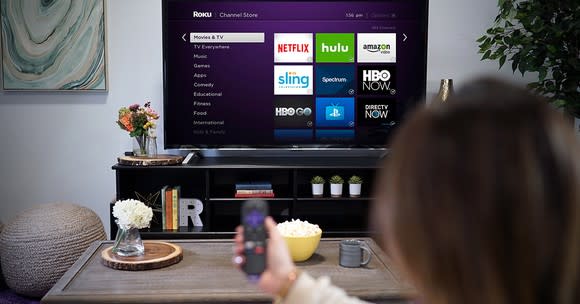What's Holding Back Growth of Roku's Platform Revenue?
One of the key things investors were watching in Roku's (NASDAQ: ROKU) third-quarter earnings release was its platform revenue. Roku derives platform revenue from its advertising products and distribution agreements with premium subscription streaming services.
While platform revenue grew 74% year over year for the quarter, topping $100 million for the first time in the company's history, it still fell about $3 million short of analysts' expectations for the segment.
What's more concerning is growth in time spent streaming video on Roku devices accelerated 6 percentage points from the second quarter quarter while platform revenue growth decelerated considerably from the 96% rate it posted in the second quarter.
So while Roku saw strong growth in engagement, it didn't showcase an ability to monetize that engagement at a level consistent with its past performance. Investors are worried that this could be the new normal for Roku.

Image source: Roku.
Here's what management had to say
Management is extremely optimistic about the future of its platform business, particularly advertising, which accounted for over two-thirds of platform revenue.
"We don't see a near-term ceiling on our growth opportunity," GM of Platform Business Scott Rosenberg told analysts on the third-quarter earnings call (courtesy of Seeking Alpha). He notes the video ad business more than doubled year over year last quarter.
"The biggest obstacle there is just the way the advertiser is used to buying ads," CEO Anthony Wood said. "By using measurement and ROI analysis, we can help move that along by showing advertisers that this new way of advertising really, really works."
Wood iterated that ad dollars haven't followed eyeballs to Roku's platform yet. He noted 10% of 18- to 34-year-olds stream video exclusively on Roku devices, but 10% of television ad budgets targeting that demographic haven't followed. Not even close. He believes ad spend allocation will align with watch time eventually.
Rosenberg later added, "I wouldn't say it's as much supply-constrained as it is about an optimization problem." So while Roku's ad supply is growing, it still has work to do to cultivate demand. That can be done by proving superior return on investment compared to the last dollar spent on traditional television ads. It can also be done by rolling out new ad products and targeting capabilities that appeal to advertisers.
Is the company forgetting about other competitors?
Management is highly focused on the traditional television ad market, but it may be missing the bigger picture. Ad budgets are very much shifting from traditional TV to digital, but Roku isn't the only digital video advertising service available.
Management often compares the scale of its user base to traditional television distributors. With 24 million active accounts, Roku would be the second-largest distributor in the United States.
But we live in a world with YouTube and Facebook (NASDAQ: FB). Alphabet (NASDAQ: GOOG) (NASDAQ: GOOGL) says YouTube remains a strong driver of the company's overall ad revenue growth. And with 1.8 billion global users streaming over one hour per day, it certainly has the scale to compete with Roku.
Meanwhile, Facebook announced time spent on its Watch platform is growing rapidly over the last few months. View time has increased three times, according to CEO Mark Zuckerberg. While overall engagement levels may be low at Facebook, it seems to be moving in the right direction. What's more, it has already proven it's capable of producing strong results for advertisers across multiple formats.
And it's not just YouTube and Facebook competing for video ads. Nearly every company with a digital presence is making a big push into video. Roku itself notes ad-supported video on demand is its fastest-growing content. While Roku partners with some providers to sell advertising, the bigger players sell ads directly.
Roku isn't just competing with the traditional way of buying television advertising, it's competing with the traditional way of buying digital video advertising as well. If Roku wants to meet the full potential of its platform, it needs to invest in a sales team and ad-buying automation technology. That will hurt its platform's operating margin, but it will produce strong long-term results.
More From The Motley Fool
Suzanne Frey, an executive at Alphabet, is a member of The Motley Fool's board of directors. Adam Levy owns shares of Alphabet (C shares) and Facebook. The Motley Fool owns shares of and recommends Alphabet (A shares), Alphabet (C shares), and Facebook. The Motley Fool has the following options: short November 2018 $155 calls on Facebook and long November 2018 $135 puts on Facebook. The Motley Fool has a disclosure policy.
